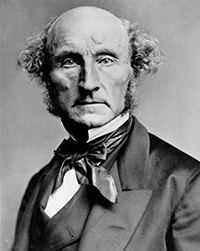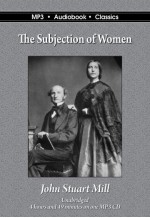John Stuart Mill
|
John Stuart Mill (May 20, 1806 – May 8, 1873) was an English philosopher, economist and civil servant who made major contributions to the disciplines of social theory, political economy and political theory. He was the eldest son of Scottish economist and historian James. A precocious child, he was raised in isolation from other children and given a rigorous academic education to foster a genius intellect. By age 10 he was fluent in Greek and Latin and had read the classics as well studied arithmetic, history, physics and chemistry. The Mills were closely connected to the Utilitarianism movement of Jeremy Bentham. As such, Mill was a non-conformist and did not swear allegiance to the Thirty-nine Articles of the Church of England and so was unable to study at Cambridge or Oxford. He joined the British East India Company at age 17 and worked in political relations with the princely states for 35 years until the company was abolished in favor of direct rule in 1858. His experience was instrumental in his defense of British imperialism as a benevolent despotism necessary to govern barbarous peoples. After 21 years of friendship he married the brilliant Harriet Taylor when her husband died. She is said to have been a co-contributor to On Liberty and a strong influence in his advocacy of women’s rights. He served as a Member of Parliament from 1865-1868, where he was the first to call for women’s suffrage. Considered by some to be the most influential English-speaking philosopher of the nineteenth century, it is fitting that he was godfather to Bertrand Russell. Fond of visits to France since age 14, he died at Avignon of an infection at age 66. |
On Liberty
In 1854 John Stuart Mill began a short essay on the relationship of authority and liberty. Five year..
$9.99
The Subjection of Women
In his essay “On the Subjection of Women” John Stuart Mill wrote at length about the moral, legal an..
$9.99



